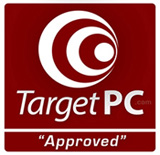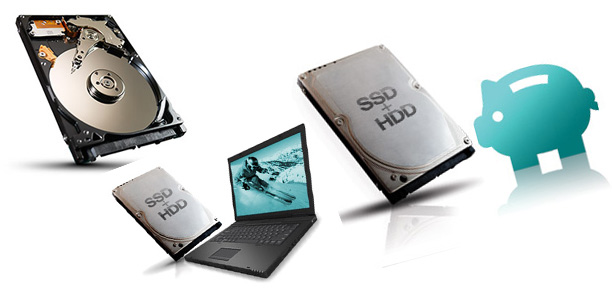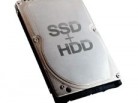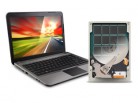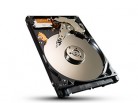The biggest bottleneck in any system is the HD. There, I said it. Although CPU manufacturers want you to invest in multi processor setups and memory manufacturers want you to buy the latest memory product, often the biggest improvement in every day system performance can be had by installing a faster HD. To that end hard drive manufacturers have upped their drive speeds from 5600 RPMs to 7200 RPMs and beyond and have continually increased the memory cache of HDs to pull more performance.
What’s cache got to do with it? Basically, as the data is read off the platters on the hard drive it is temporarily stored in cache waiting to be sent via the ribbon cable to the motherboard to be used. Increasing cache allows more data to be queued ready for transfer and use. Increasing cache can have a big effect but it doesn’t solve the problem. Here’s where Seagate started thinking out of the ‘hardware box’ and started thinking how they could improve performance. They set a lofty goal – approach solid state hard drive performance while still using existing hard drive technologies.
Solid state hard drives utilize memory only – there are no moving parts. Therefore, the thing that can slow a drive like this down is the physical limitations of the memory installed in it. Sounds like the perfect drive right? Markets being what they are prices for memory are volatile. One natural disaster that shuts down a factory will stop the production of chips and raise their prices. Add the fact that most SSD hard drives have smaller capacities (there’s a limit to the size of the chips stuffed in them) and you have a more expensive drive with smaller capacity that has blistering performance.
Seagate took their approach differently. The initial specs of the drive don’t give up too much at first how they planned to reach their performance goal: A standard 2.5 format that fits laptops, 32 MB of DRAM cache, and 7200 RPM speed. Seagate then threw in 8 GB of NAND flash, and most importantly, Adaptive Memory Technology. NAND flash is solid state memory – basically you get an 8 GB solid state drive coupled onto a standard HD. Adaptive Memory Technology is a solution that exists as software on the actual drive. No matter what operating system you choose this technology will organize your most frequently accessed data. A big chunk of your boot up data is held in the NAND flash to create a feature called "Fast Boot”.
So basically, no matter what OS you pick, your OS files will mostly be stored on the solid state area of the drive as well as data you access frequently. The claimed boot up improvement by Seagate is 3x faster than a traditional drive. Does it pan out? I installed this drive in a Sony Vaio laptop that still had a 5600 RPM drive. Laptops often use slower drives to limit noise and to improve battery life. My boot up with Win 7 went from a yawn inspiring 47 seconds to 24 seconds. Not 3x faster but there are other improvements I noted down the road. With more boot ups the boot up time improved to 21 seconds. Depending on how much data you are loading at boot up you may see even bigger improvements than I did. I have to tell you I’m very happy with this improvement. Here’s the caveat: the more I used my regular programs the more of this data was moved to the NAND flash. I could tell because suddenly those programs opened almost instantly. This is an everyday use type of improvement. I wish there was a way to boost performance with other areas of my computer’s performance this easily. You can’t boost USB performance without buying a newer computer that has new hardware support. Likewise, the chipset on your motherboard governs how fast a processor or memory you can install. Boosting boot up time and everyday data performance is actually more noticeable than any of those other improvements. In HD Tach I was able to get average read times of 111.4 Mb/s. Burst read came out to 903.7 Mb/s. These are impressive numbers. Not all the way to SSD performance numbers but this blows away any other non solid state drive I've ever seen.
Seagate has hit a home run with the coupling of SSD technology, Adaptive Memory Technology, and good HD design. The Momentus XT 750 GB gives ample storage with impressive performance. MSRP on this drive is $229 I found it online for $129 from one vendor but at an average price under $200 it’s a very good investment. Seagate provided an installation kit with the test unit. If you buy the unit directly from Seagate you also get this kit. I can’t say if vendors have access to the kit with the units they are selling. To get faster performance you'd have to buy a real SSD drive. At about $400 for 250 GB you'd need three of those. $1200 vs $200 doesn't justify the performance increase in my book, and of course there are always deals to be had between competing vendors.

